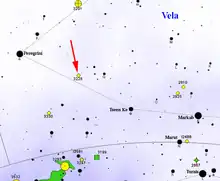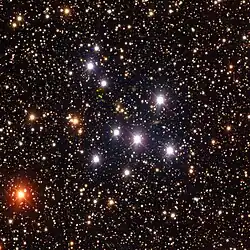| NGC 3228 | |
|---|---|
 Location of NGC 3228
NGC 3228 DSS.jpg | |
| Observation data (J2000 epoch) | |
| Right ascension | 10h 21m 22s[1] |
| Declination | −51° 43′ 42″[1] |
| Distance | 1,870 ly (573 pc[2]) |
| Apparent magnitude (V) | 6.0 [1] |
| Apparent dimensions (V) | 11'[2] |
| Physical characteristics | |
| Estimated age | 260 million years[2] |
| Other designations | Collinder 218, vdBH 93 |
| Associations | |
| Constellation | Vela |

NGC 3228 is an open cluster in Vela. It was discovered by Nicolas Louis de Lacaille in 1751–1752, while he was in South Africa and catalogued it as Lac II.7.[3] It is small but bright and can be observed easily with binoculars in sufficiently dark skies.[4]
It is a cluster of Trumpler type I1p or II3p, with few members with large brightness range and a slight concentration toward its center.[3] Klarchenko et al. mention 53 possible members within the angular diameter of the cluster. The tidal radius of the cluster is 1.4 – 5.5 parsecs (4.5 – 18 light years) and represents the average outer limit of NGC 3228, beyond which a star is unlikely to remain gravitationally bound to the cluster core.[2] The brightest member is of mag. 7.9 and the hottest star is of spectral type B9.[3] One member, HD 89856 (mag. 9.04, spectral type B9), is a variable star with period 4.556 days.[5]
References
- 1 2 3 "NGC 3228". SIMBAD. Centre de données astronomiques de Strasbourg. Retrieved 2015-06-19.
- 1 2 3 4 Kharchenko, N. V.; Piskunov, A. E.; Schilbach, E.; Röser, S.; Scholz, R.-D. (3 October 2013). "Global survey of star clusters in the Milky Way". Astronomy & Astrophysics. 558: A53. arXiv:1308.5822. Bibcode:2013A&A...558A..53K. doi:10.1051/0004-6361/201322302. S2CID 118548517.
- 1 2 3 Kronberg, Christine; Frommert, Hartmut. "NGC 3228". messier.seds.org.
- ↑ Monks, Neale (2010). Go-To Telescopes Under Suburban Skies. Springer Science & Business Media. p. 40. ISBN 9781441968517.
- ↑ Paunzen, E.; Hensberge, H.; Maitzen, H. M.; Netopil, M.; Trigilio, C.; Fossati, L.; Heiter, U.; Pranka, M. (26 November 2010). "A photometric long-term study of chemically peculiar stars in open clusters". Astronomy & Astrophysics. 525: A16. arXiv:1012.0149. Bibcode:2011A&A...525A..16P. doi:10.1051/0004-6361/200913789. S2CID 15373925.
External links
- NGC 3228 on WikiSky: DSS2, SDSS, GALEX, IRAS, Hydrogen α, X-Ray, Astrophoto, Sky Map, Articles and images